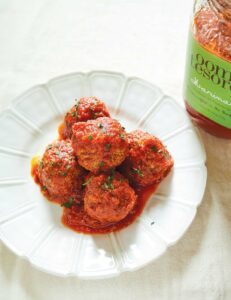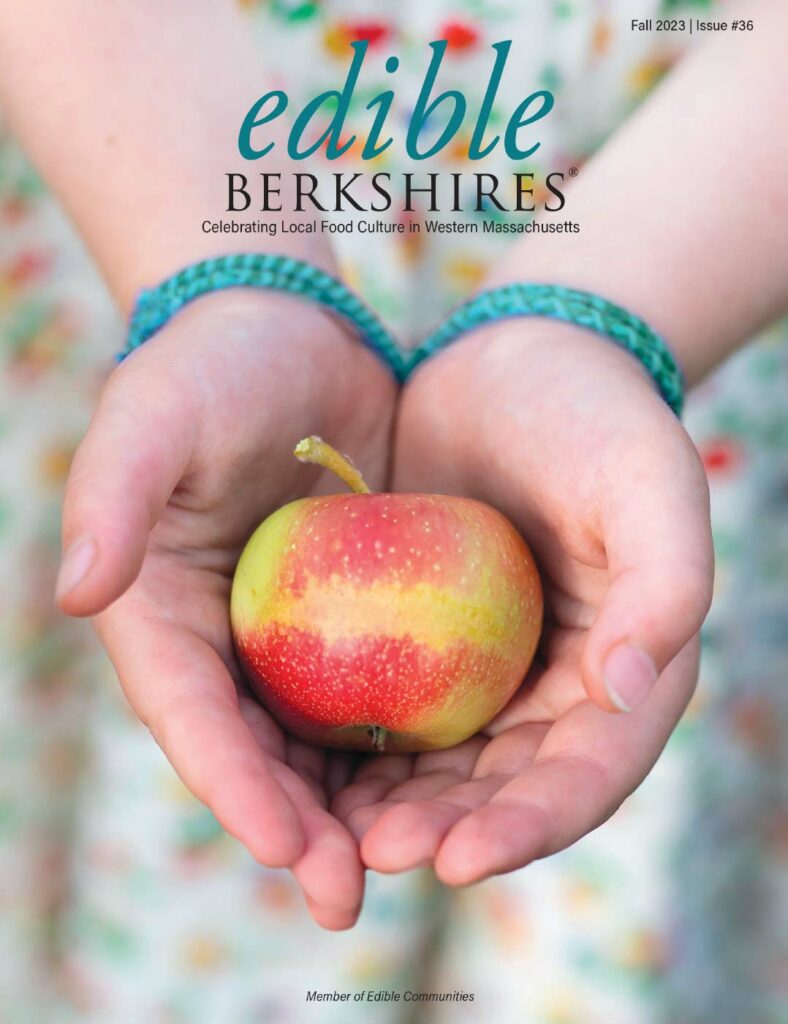Honoring His Ooma
PHOTOGRAPHS BY CHRISTINA RAHR LANE
The vine-ripened plum tomato is a treasure among sauce makers. The Italians dubbed the essential ingredient il pomo d’oro—the golden apple—evidence of their enduring love affair with the prized, albeit humble, fruit. For Michael Tesoro, it’s both a fun fact and the foundation upon which his family’s business, one inspired by his paternal grandmother (and the fact that he couldn’t quite pronounce nonna when he was young) has been built.
“To make a great sauce, you must start with the best tomatoes,” says Michael, founder and CEO of Ooma Tesoro’s in North Adams. It’s seminal wisdom he garnered some four decades ago while learning to make Sunday sauce, sans recipe, with his grandmother (Ooma) in her Brooklyn kitchen. “Food was at the center of our getting together, no matter what,” Michael says, recalling the old-school Italian- American way of living and eating—where food was a means of showing love.
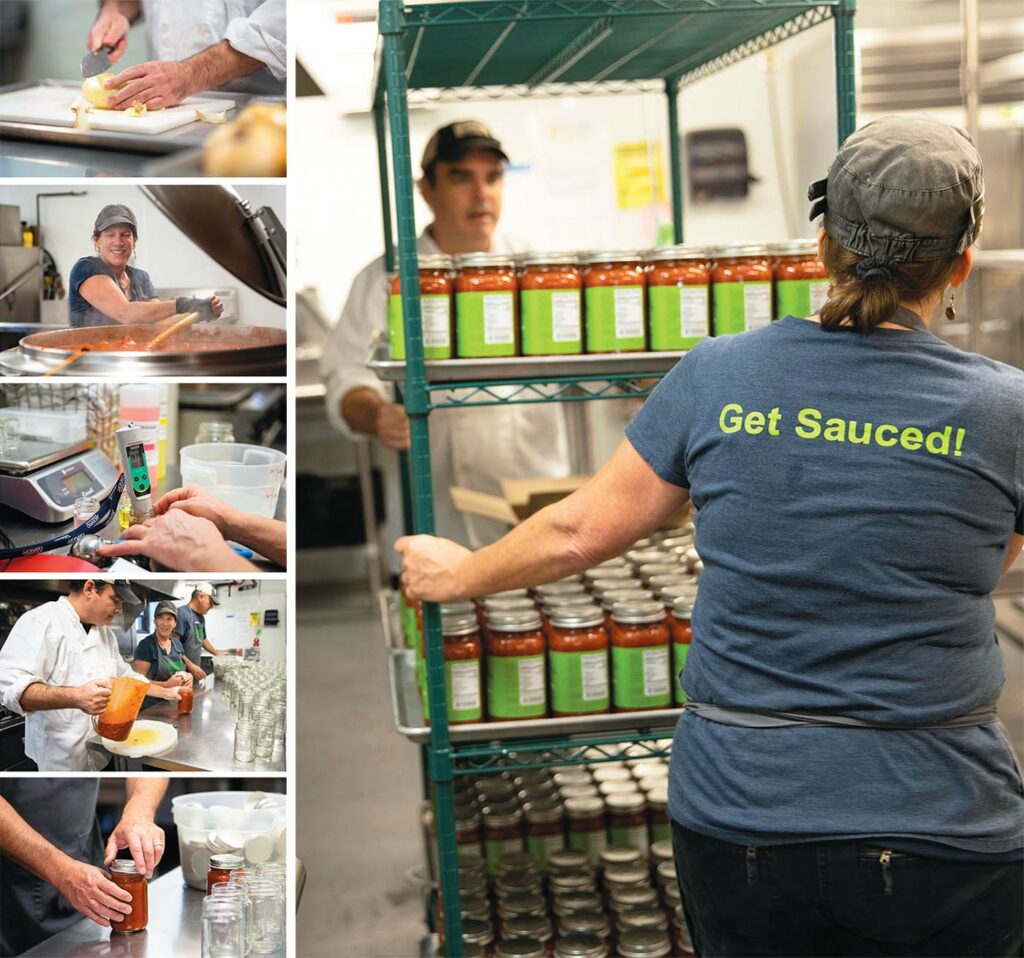
OOMA’S WAY
“Ooma Tesoro kind of brought me under her wing and showed me how to make the sauce,” he says. It was in her tiny house on East 31st Street, stuffed with cousins, that his lifelong love of cooking was born. After more than a dozen years, demand for the small-batch sauce he and his wife, Robin, began jarring at home in 2009 continues to rise.
“Our story has been one of perseverance more than anything,” says Michael, whose Insta handle—@saucemaker—says it all. He still makes marinara like his Ooma Tesoro did, using nothing but tomatoes, extra virgin olive oil, fresh onions, garlic, sea salt, and herbs.
Each batch begins with 900 pounds of whole plum tomatoes, which are painstakingly peeled, cored, and seeded on a tabletop device turned secret weapon. It’s an essential first step in achieving the sweet, chunk-free consistency of his family’s handcrafted sauce. And it has a history: In Italy, prior to the 19th century, tomatoes were deemed dangerous—if not poisonous—due to the toxicity associated with nightshades, thought to accumulate in the fruit’s skins and seeds.
“Nobody else does this,” explains Michael of a time-consuming process that “brings a big level of purity” to their product, whose shelf-life is 24 months. The cooking process begins on a 30-gallon tilt-skillet (repurposed from a kitchen at General Electric in Pittsfield by way of the Stationery Factory in Dalton), where onions and garlic are braised in olive oil until they begin to soften. Sauce making commences in a pair of kettles, “at a very slow, simmering rate,” and yields 120 gallons per batch, which, by industry standards, is very small. “Most of our competitors, even those that are local, [make sauce] in excess of 500 gallons per batch,” says Michael.
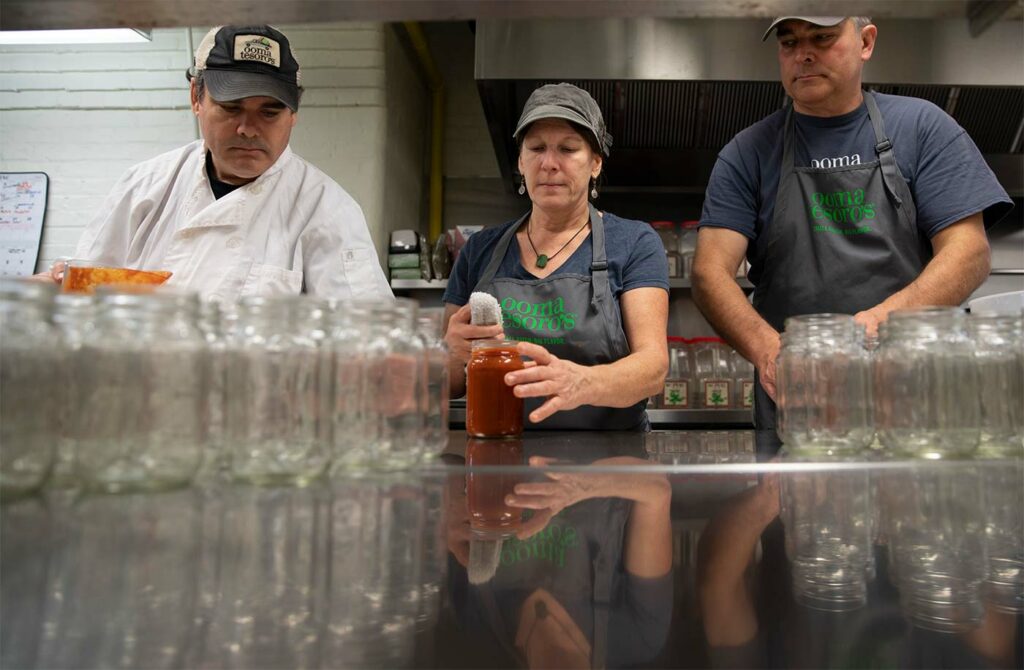
SPIKE IN DEMAND FOR OOMA’S SECRET SAUCE
Since 2020, safeguarding the family recipe has been a cinch: The company’s cucina is ensconced behind the solid stone-and-brick facade of the armory on Ashland Street in North Adams (one of nine in the Commonwealth closed by the National Guard in 2003). There, on the ground floor, Michael and a small but mighty team—including Jill Pizzuto, production manager—churn out 16- and 26-ounce jars by the dozen while local youth bounce basketballs in the community gymnasium above them.
“It’s like running on a treadmill, fast and then faster, if and when we need to increase production,” says Michael. He needed to do just that during the pandemic, when demand boomed. In fact, he was doing an in-store demonstration at a Whole Foods in Newton when he first caught wind of the impending lockdown. It was a historic moment marked by folks clearing the shelves of pasta and sauce products until nothing remained.
“Demand doubled during COVID,” says Michael. When Ooma Tesoro’s was given the nod as an “essential business,” he got busy making and delivering sauce to the Boston area; the company’s van was often one of just a few vehicles on the Mass Pike in the earliest days. Parked outside their fortified commercial kitchen, the Ooma Tesoro’s van “is the lifeblood of the business,” according to Michael.
Its importance is second only to the sauce. He uses the iconic vehicle (emblazoned with a giant jar of marinara) to pick up various hand-selected ingredients from across the state and to deliver product to destinations across New England. Jars destined for more far-flung locales—including epicurean markets in Dayton, Ohio; Sarasota, Florida; and Los Angeles, California—are shipped, as are cases ordered via the online store.
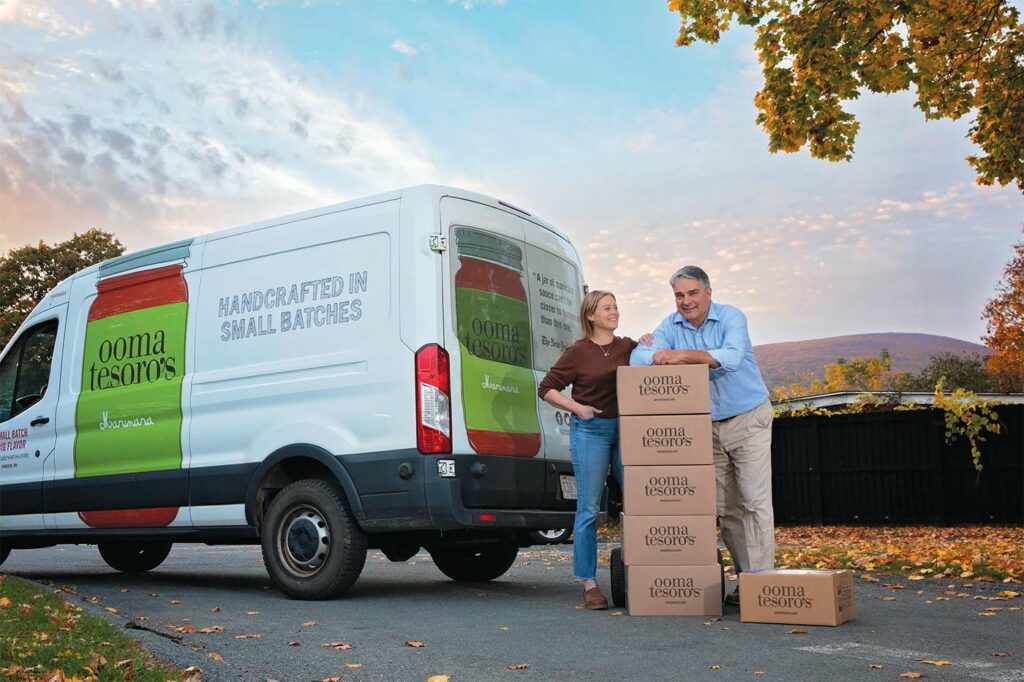
IT TAKES A TEAM
If Michael brings persistence and tenacity to the table, the other half of the husband-wife team is thinking outside the jar. “All of the artistic elements are my passion,” says Robin Tesoro, who, in her role as creative director and business manager, handles everything from processing online orders and balancing the books to branding and providing design direction. “I love working with other creative people to help us implement marketing ideas into something tangible,” she says of the yin-yang required to make the family business work.
While a huge fan of cooking at home, Robin stepped away from the commercial kitchen several years ago to better manage the intricate dance of balancing work and family.
The warehouse is whittled down to bare bones essentials. Pallets of tomatoes (grown in California and packed in BPA-free cans) are stacked at one end of the sparse space, with jars of finished product on the other side. And then there’s the by-product of all that comes in between production and distribution. The company reduces its environmental impact by recycling everything from tomato cans to kitchen scraps, with the latter destined for the compost heap at Holiday Brook Farm in Dalton. A single, kitchen-size wastebasket collects the few remaining bits that are garbage.
“Our sauce is not just for spaghetti,” says Michael, in a nod to the versatility of Ooma Tesoro’s. It works on everything from pizza and pasta to chicken and fish. It’s also ideal for slowly simmering ricotta meatballs (see Robin’s recipe). One customer even wrote to say that, when combined with vodka, Tesoro’s sauce makes a mighty Bloody Mary.
“Our product continues to get better and better with every batch we make,” says Michael. The company’s laser focus on making just one product in two sizes allows him not only to hone his craft, but to perfect his product in the process.
“Everyone in our product space is trying to race to the middle,” says Michael of where the largest market lies—one that requires a compromise on ingredients he’s not willing to make. And so he continues to treasure his days spent cooking, and by extension feeding, a growing community of family, friends, and neighbors as his Ooma Tesoro did before him.
As romantic a notion as handcrafting a product in the Berkshires may be (legend has it that Michael wooed Robin with Ooma’s sauce long before their company took root), Robin is the first to acknowledge the commitment required when manufacturing a food product.
“It is extremely grueling [and] very hands-on,” she says. But she savors the inevitable rewards: “Having created something from scratch and hearing people tell us how much this sauce reminds them of their grandmother’s [is such] a compliment,” she says, “We can’t stop when we hear that.”
“Having created something from scratch and hearing people tell us how much this sauce reminds them of their grandmother’s [is such] a compliment.” —Robin Tesoro
